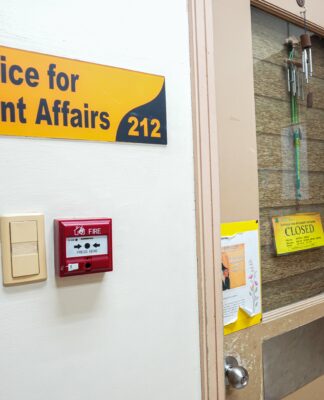WHILE the University has yet to adopt its own Students’ Code, lawmakers in the national government are working to pass a bill that will serve as the Magna Carta of Students.
Kabataan party-list Rep. Terry Ridon, a proponent of the students’ rights bill, said “intense lobbying” of schools hindered its passage for almost 15 years in Congress.
“Hopefully, within the next two to three weeks, magkakaroon na po ng technical group meeting [para] mapag-uusapan po in detail ang bawat provision,” Ridon said in an interview.
Ridon, however, clarified that the passage of the bill still depended on the entire Congress. “It’s hard to put the date of the approval of the bill kasi it will be the house majority that will [decide whether to] pass the bill [or not],” Ridon explained.
Former Albay Rep. Edcel Lagman will serve as chairman of the technical working group, which will be composed of representatives from the Commission on Higher Education and the House Committee on Basic Education and Culture. Ridon and Akbayan party-list Rep. Ibarra Guiterrez III will serve as co-chairpersons.
Several house bills (HB) that tackle students’ rights and welfare, namely HB 1098 by Ridon, HB 2870 by representatives Diosdado Arroyo and Gloria Macapagal-Arroyo, and HB 4435 by Guiterrez and Akbayan party-list Rep. Walden Bello, will be consolidated by the technical working group into one Magna Carta for Students.
Moratorium on school fee hike
Sarah Elago, National Union of Students of the Philippines president, also said during the meeting last Feb. 13 that the government should guarantee the right of every citizen to quality and accessible education by imposing a three-year moratorium on all school fee increases.
“Education should not be treated as a commodity but as a public good and public responsibility, as it is necessary for the general welfare of our society,” Elago said.
She called on the government to address problems in the education sector and issue guidelines on school fee increases.
But according to Joseph Noel Estrada of the Coordinating Council of Private Educational Associations (Cocopea), imposing a moratorium would result in the loss of the equivalent to eight enrollment years in college, or P150 billion worth of school fees, citing a study done by Cocopea.
Also present in the joint meeting were representatives of the Commission on Higher Education, the Philippine Association of Colleges and Universities, and the Catholic Educational Association of the Philippines.
Youth representatives also attended the meeting, including those from Rise for Education, Student Christian Movement, Student Council Alliance of the Philippines, Students’ Rights and Welfare Coalition, and the National Youth Commission.

















